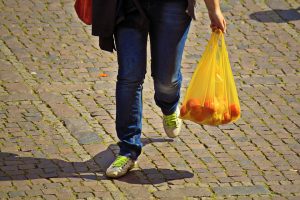On Banning Plastic Bags

As more and more supermarket chains and other retailers pull plastic bags from their stores, presumably to do something for the environment, it is worth looking at the issue in a bit more detail. And the real question that must be asked here is this: Is this move in fact better or worse for the environment?
While stores are now pulling bags, the debate is not at all new. Ten years ago I also wrote on the plastic bag issue. The Labor Party Environment Minister at the time, rocker Peter Garrett, was gung ho on such a ban. I looked at the dodgy science back then, and finished with a quote from Andrew Bolt:
“Fact: People love plastic bags too much to give them up even if made to pay. Ask Ireland, which imposed a levy on bags only to find more than ever were being used, with only a small cut in the number turning up as litter. And the Productivity Commission warned a levy or ban wouldn’t work any better here: ‘A cost-benefit study commissioned by the governments shows that the benefits of a phase out or a per-unit charge would be significantly outweighed by the costs.’ It concluded: ‘A more cost-effective approach would be to target littering directly.’ How about that? Just hit the naughty litterer, not the struggling shopper, the food-wrapping clean fiend and the civic pooper-scooper.”
By all means let’s have some concern for the environment. But let that concern be level-headed and evidence-based. We don’t need any more panic-mongering and guilt-tripping by wealthy bureaucrats, politicians and rock stars.
Nothing has changed during the past decade. More fear-mongering, more fake-science, and more bogus moves that will not really help the environment, but will harm many folks – the poor especially. As is so often the case, most of our politicians and media commentators have done little homework in these areas.
They prefer mouthing feel-good platitudes and resorting to mushy moralising instead of looking at the actual facts. And the facts are NOT what the activists want us to believe. Let me run with some recent articles on this, beginning with a piece by Canadian writer Matthew Lau.
He begins by looking at a similar ban in Montreal to the ones Woolworths and Coles will soon introduce in a number of Australian states. He then writes:
The ill-conceived ban is a policy that cannot possibly pass a cost-benefit analysis, not least because politicians have no way of measuring the cost of the regulation — that is, the amount of inconvenience that the ban forces consumers and businesses to suffer. Meanwhile, there is pretty strong evidence that the benefits of the regulation (supposedly a cleaner environment) are either zero or negative.
In the first place, one of the reasons plastic bags are so popular is because of all the ways they make the environment cleaner and less hazardous to humans. Dog walkers use plastic bags to clean the environment of pet waste. People use plastic bags to carry clothes and books and everything else from place to place in order to keep their belongings clean from the dirt on the ground.
Plastic grocery bags are also an excellent way to protect people from bacteria in the environment, because they are disposable. By contrast, reusable grocery bags can be “a serious threat to public health,” according to Charles Gerba, a University of Arizona microbiologist and co-author of a study on grocery bags. He noted that health risks of reusable bags came “especially from coliform bacteria including E. coli, which were detected in half of the bags sampled.”
Another study by professors at the University of Pennsylvania and George Mason University examined the connection between San Francisco’s plastic bag ban and bacteria-related illnesses. They concluded that “both deaths and ER visits spiked as soon as the ban went into effect. Relative to other counties, deaths in San Francisco increase by almost 50 per cent, and ER visits increase by a comparable amount. Subsequent bans by other cities in California appear to be associated with similar effects.”
Far from causing environmental harm, the main use of plastic bags is to make the environment cleaner for humans, such as by keeping bacteria out of groceries. Nevertheless, bag ban advocates insist that the bags are indeed environmentally harmful, and must be outlawed to fight climate change.
business.financialpost.com/opinion/banning-plastic-bags-is-actually-terrible-for-the-environment-and-makes-us-sicker
His entire piece is a must read, but let me move on to some words by Benedict Brook. He too provides plenty of facts and figures as he dispels numerous green myths along the way. For example, he looks at some of the alternatives:
But research on how we use carrier bags, some commissioned by Woolworths itself, has shown that reducing their environmental impact could be more problematic than many of us assume. A 2009 report produced for Woolworths by researchers at RMIT calculated the environmental impact of single use carrier bags versus their reusable counterparts. The classic supermarket bag, the type being banned, is made from high density polyethylene (HDPE). Compared to other bags it’s not that great environmentally — but it certainly doesn’t have the worst impact.
On measures such as its contribution to global warming and water usage, it actually scores well. In landfill they compress and so take up very little space. But it falls down on energy consumption and the effect on marine life. Other research has said light density polyethylene (LDPE) bags, the thicker type available for a few cents at the supermarket, are generally worse than their thinner counterparts….
The worst bags are actually paper bags. Sure, they break down after use but the energy consumption and materials used to produce them are off the scale. Taking all this into account, the report was able to work out how many times you needed to use an alternative to a single use plastic bag for it to have a lesser impact on the environment.
“The benefits of a reusable bag are highly sensitive to the number of times each bag is used during its life,” said the report. “For example, if a reusable PP green bag is only used 52 times (weekly for a year) instead of the assumed 104 times (weekly for two years) then its impact on global warming is higher than the impact of each of the single-use bags except the paper bag.”
Other reports confirm plastic bag replacements are far worse environmentally if they are only used a handful of times and then loiter, unloved, in a corner. A 2016 report by the NSW Environmental Protection Agency (EPA) found a cotton bag had to be used 131 times to equal the environmental impact of an HDPE bag used just once. A 2006 UK Government report came to a similar conclusion.
www.news.com.au/technology/environment/climate-change/plastic-bag-ban-many-alternatives-have-huge-environmental-footprints/news-story/2ea67901345f07b6515bcb71e20c708f#.15jr5
Also, commentator Rita Panahi reminds us that “Supermarkets the big winners from plastic bag ban”. She says:
But it’s not Australians who are dumping plastic bags and other rubbish in waterways in large numbers. The fact is that the majority of the plastic in the world’s oceans come from five countries: China, Indonesia, the Philippines, Vietnam and Thailand. These five are contributing around one million tonnes of plastic trash to the seas each year, according to US environmental non-profit group Ocean Conservancy. A comprehensive study of plastic pollution published in 2015 suggested that the waste produced by the top polluting countries was even higher.
The research published in the journal of science ranked the top 20 polluting countries and found that 192 countries produced 275 million tonnes of plastic and between 4.8 to 12.7 million tonnes of this waste washed into the sea in a single year. China was the worst culprit, responsible for 1.32 to 3.52 million tonnes, followed by Indonesia and the Philippines. Australia contributed less than 0.01 tonnes to ocean plastic pollution. What sort of simple-minded mug believes that plastic bag bans in Australia will have any sort of impact in countries with poor sanitation practices where plastic is routinely dumped in the nearest waterway?
She too looks at some of the other studies on this:
A recent study in Britain, where plastic bags are taxed, found reusable bags needed to be reused up to 173 times before they had a lower environmental impact than ordinary plastic bags. “The environmental impact of all types of carrier bag is dominated by resource use and production,” it found. “Whatever type of bag is used, the key to reducing the impacts is to reuse it as many times as possible and where reuse for shopping is not practicable, other reuse, eg store-place bin-liners, is beneficial,” it said. A 2012 University of Pennsylvania study found San Francisco’s 2007 plastic bag ban killed people because reusable bags increased shoppers’ exposure to harmful bacteria that can infest them. “The San Francisco ban led to, conservatively, 5.4 annual additional deaths,” the authors concluded.
www.heraldsun.com.au/news/opinion/rita-panahi/rita-panahi-supermarkets-the-big-winners-from-plastic-bag-ban/news-story/2630b7d9f93bcf9f2254ca485a8ffb11
And a piece in today’s Australian by Adam Creighton is worth quoting from. He too notes the shoddy science being pushed here. He begins:
The author of a landmark study into plastic bags has likened to “religion” their impending removal from supermarkets, suggesting arguments against them are “complete furphies you can demolish in a few minutes of analysis”. Phillip Weickhardt, lead author of a 2006 Productivity Commission inquiry into waste management, said raising fines for littering made more sense. “This is largely religion, deeply felt,” he told The Weekend Australian. “Plastic bags are useful: hygienic, water proof. They have multiple uses and functions,” he added.
Coles will join Woolworths in removing “single use” plastic bags from its stores next month, extending nationwide bans on the ubiquitous bags already in place across all states and territories except NSW and Victoria. “The evidence plastic bags hurt marine life is very unpersuasive. When we looked at this we found that a lot of studies just cite each other; in fact we sourced it all back to some guy in Canada in the 1970s who’d done a study on the effect of fishing ropes on marine life,” he said.
www.theaustralian.com.au/business/supermarket-plastic-bag-ban-like-religion/news-story/6c41c0b6d5a542b9188cad457a02253f
But lest critics claim I am simply being biased here, let me conclude with an article found on the ABC Science website. The ABC can hardly be dismissed as a right-wing propogandist outfit. The piece looks at the green bags and finds them to be no panacea:
So-called “green bags”, which have been available in supermarkets now for a number of years, are a heavy-duty, non-woven polypropylene. These are much thicker and more robust than the 15-cent reusable variety, and usually retail for between $1 and $2. Polypropylene film, which is a type of plastic, is a by-product of oil refining. Despite being a product of fossil fuels, they’re a relatively low-energy intensive product to make. According to the British study, the production of polypropylene bags created about 11 times the “global warming potential” of single-use bags.
In other words, you have to use your green bags 11 times to break even from an emissions perspective. But they’re relatively efficient in terms of water use, and are strong enough to be used for years. According to Green Bag Co Australia, they can be thrown in the washing machine to clean, although they caution against putting them in the dryer, as polypropylene “can’t withstand high heat”. The drawback to the green bags though is they can break down into microplastics if they find their way into the environment and cause the same issues as their lightweight cousins.
www.abc.net.au/news/science/2018-06-20/plastic-bag-ban-options/9874474
Yes, we all need to have proper concern about the world we live in, and how our lifestyles impact on it. But sense and science, rather than emotions and hysteria, should be the way we proceed here. Oh, and by the way, our household has used cloth bags for years now, and no, I am not in the pay of the plastics industry.
Source: https://billmuehlenberg.com/2018/06/23/on-banning-plastic-bags/










From July they will cost 15 cents at Coles.
I have my own bags – lots of them – the most recent ones are not made to last long.
I go to the SMart: on my mobility scooter – I cannot walk – not much at all really & shopping must happen.
I have a strong cardboard box on the floor of the scooter – free from Bunnings – 2 bags fit in it & 1 bag on top, a basket in front for delicates like bread & cookies / bikkies etc.
Bottles & cartons fit is the box without a bag & 1 bag for fall about items.
I need a plastic bag for the ready roast chook that leaks most of the time – I will not pay – I need a plan B here.
Interesting Video – must watch actually – How to get up from the floor (after a fall) MacGyver style -Youtube
I fell on the ground in my backyard last Wednesday.
My phone was inside.
My walker was inside.
Silly me went out with just my walking stick.
After the initial shock, I dragged myself, on my bum, into the kitchen, rested against the fridge for a while & looked for ways to get myself upright.
Lucky that, quite by chance I had watched the above mentioned video.
I made me less spooked & reassured me that I was able to manage.
All up it took 3/4 of an hour.
I asked Mr. Gazzman –
An Authentic African Shaman, who lives in the next suburb –
To put a humdinger of a curse, a real whammy !!
Upon the general surgeon, LaughingFatBoy, who put this pacemaker into my left breast –
If you are in a bar, in town & a rather tall, obese, man goes SPLAT.
The curse worked.
Mr. Gazzman guarantees all his work, with a promise of a refund of money if he fails.
He does not come cheap.